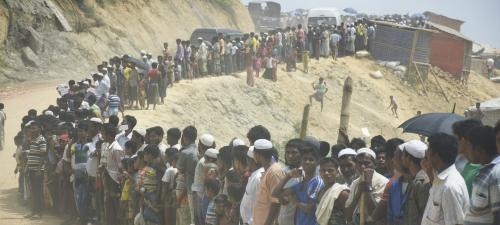UN agencies and Myanmar ink agreement, setting stage for Rohingya return
Two United Nations agencies signed a landmark agreement with the government of Myanmar on Wednesday, which they hope will provide hundreds of thousands of Rohingya refugees with a pathway to return home, from overcrowded camps across the border in Bangladesh.

Thousands of Rohingya refugees line the roads of the Kutupalong mega refugee settlement as the United Nations Security Council visit takes place. Many hold signs welcoming the visit and saying they want justice, as well as stating their key demands for repatriation.
Ahead of the signing, UN Resident and Humanitarian Coordinator in Myanmar, Knut Ostby, said in an exclusive interview with UN News that the two most important conditions for their safe and voluntary return are citizenship rights and an end to violence.
“People need to have an identity, they need to be able to exist as normal people in society, they need to be able to move around so they can enjoy services and livelihoods,” he said.
“And there needs to be an absence of violence. People need to be able to return in peace,” he added.
Since August last year, some 700,000 mainly-Muslim Rohingya have fled Rakhine State, in majority-Buddhist Myanmar, for neighbouring Bangladesh. Most say they were fleeing violence and persecution, including a military campaign by Myanmar forces, which began in response to violent attacks by Rohingya insurgents.
The Memorandum of Understanding, which was officially signed by the Office of the UN High Commissioner for Refugees (UNHCR), the UN Development Programme (UNDP), and the Government of Myanmar, will give these two UN agencies access to Rakhine State, including to refugees’ places of origin and potential new settlement areas that the UN has so far been unable to access since the violence escalated at the end of last August.
"This is a first, and very important step, but it is now that the really important work starts," said Mr. Ostby. "It was a major crisis last year. Hundreds of thousands, (are) living in really horrible conditions today, and we really need to do our best to help them, so they can return home," he added.
The access, once verified, will allow UNHCR to assess local conditions and help the refugees to make informed decisions on voluntary return.
The agreement will also allow UNHCR and UNDP to carry out needs assessments in affected communities and strengthen the capacity of local authorities to support the voluntary repatriation process.
The Advisory Commission on Rakhine State – a neutral and impartial body composed of six local experts and three international experts, chaired by former UN Secretary-General Kofi Annan – has proposed concrete measures for improving the welfare of all people in Rakhine State.
Its recommendations include establishing a clear and voluntary pathway to citizenship and ensuring freedom of movement for all people there, irrespective of religion, ethnicity or citizenship status.
The Rohingya have not been granted any level of citizenship, or citizenship rights, which is a major impediment to their return home.
Source:United Nations
- 294 reads
Human Rights
Fostering a More Humane World: The 28th Eurasian Economic Summi

Conscience, Hope, and Action: Keys to Global Peace and Sustainability

Ringing FOWPAL’s Peace Bell for the World:Nobel Peace Prize Laureates’ Visions and Actions

Protecting the World’s Cultural Diversity for a Sustainable Future

Puppet Show I International Friendship Day 2020

